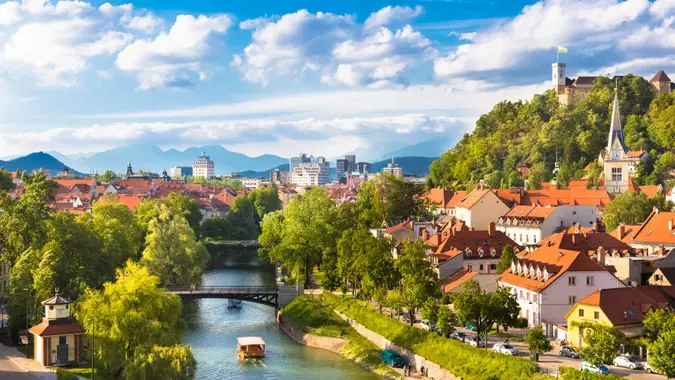European Net Worth: How Much to Be Poor, Middle-Class, or Rich in Europe

Commitment to Our Readers
GOBankingRates' editorial team is committed to bringing you unbiased reviews and information. We use data-driven methodologies to evaluate financial products and services - our reviews and ratings are not influenced by advertisers. You can read more about our editorial guidelines and our products and services review methodology.

20 Years
Helping You Live Richer

Reviewed
by Experts

Trusted by
Millions of Readers
In the diverse economic landscape of Europe, understanding one’s financial status involves more than just income. It encompasses net worth, which includes assets like savings, home equity, investments, and debts. According to Statista when reporting on average financial wealth throughout Europe notes, “449,000 U.S. dollars in Switzerland to roughly 1,200 U.S. dollars in Azerbaijan. In Europe, the overall average financial wealth per adult as of 2022 was 84,308 U.S. dollars.”
Here’s an estimation of what it might mean to be poor, middle-class, or rich in Europe, in terms of net worth.
Poor Europeans
Given the varying poverty thresholds across Europe, those classified as poor likely have very low or even negative net worth. This group would typically have minimal assets like savings or home equity, and could be burdened with debt. Considering these factors, their net worth could be estimated at:
- Range: $0 to $15,000
- Key Factors: Little to no savings, potential debts, minimal or no home equity.
Middle-Class Europeans
The middle-class in Europe can vary greatly, but generally, this group is defined by a more stable financial situation, often including some home equity and savings. With the median income as a guideline, and considering assets like average home values and retirement savings in more affluent countries, the net worth range for the middle class in Europe would be around:
- Western and Northern Europe (e.g., Germany, France, Sweden, Norway): $100,000 to $700,000
- Southern Europe (e.g., Spain, Italy): $50,000 to $300,000
- Eastern Europe (e.g., Poland, Romania): $30,000 to $200,000
- Key Factors: Home equity, savings, retirement accounts, and manageable levels of debt.
Upper Middle-Class and Rich Europeans
This category includes individuals with net worth significantly above the average, characterized by substantial assets and minimal debts. The upper middle-class would have higher equity in real estate, larger retirement savings, and other investments, while the rich would possess extensive asset accumulation.
- Upper Middle-Class: $700,000 to $1.5 million
- Characteristics: High real estate equity, substantial retirement savings, diverse investment portfolios.
- Rich: Starting from $1.5 million upwards
- Characteristics: Significant asset accumulation including multiple real estate properties, large investment portfolios, and other valuable assets.
Implications for Europeans
Understanding these net worth thresholds is crucial for Europeans for several reasons:
- Financial Planning: It aids in setting realistic financial goals and strategies.
- Economic Positioning: Helps individuals understand where they stand in their country’s economic spectrum.
- Policy and Aid: Knowledge of these thresholds is important for accessing government assistance and understanding policy impacts.
Conclusion
In Europe, being poor, middle-class, or rich involves a broader perspective than just income. It’s about understanding the entire financial picture, including assets and debts. These estimations provide a framework for Europeans to assess their economic status and plan accordingly, keeping in mind the unique economic conditions of their respective countries.
Editor's note: This article was produced via automated technology and then fine-tuned and verified for accuracy by a member of GOBankingRates' editorial team.
 Written by
Written by  Edited by
Edited by 

























